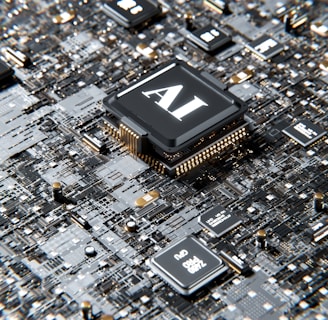The Future of AI: How Artificial Intelligence is Transforming Industries
TECHNOLOGY
2/2/20254 min read


Introduction
Artificial Intelligence (AI) is no longer a concept confined to science fiction. It has become an integral part of our daily lives, influencing everything from how we shop online to how businesses operate. AI’s rapid development and integration into various industries have led to significant changes in efficiency, productivity, and innovation. As AI continues to evolve, it is poised to reshape industries in ways we have yet to fully comprehend.
The Evolution of AI
Artificial Intelligence has come a long way since its inception. What started as simple algorithms designed to perform specific tasks has now evolved into complex machine-learning models capable of self-learning and decision-making. The integration of AI into industries has been driven by advancements in computing power, big data analytics, and sophisticated algorithms.
Key AI Technologies Driving Change
Machine Learning (ML): AI’s ability to learn from data and improve without explicit programming.
Natural Language Processing (NLP): Enables machines to understand, interpret, and generate human language.
Computer Vision: AI-powered visual recognition and image processing technology.
Robotics: Intelligent automation that enhances efficiency in manufacturing, healthcare, and logistics.
Generative AI: AI-driven creativity used in content creation, design, and software development.
Industries Being Transformed by AI
1. Healthcare
AI is revolutionizing healthcare by improving diagnostics, personalizing treatments, and optimizing hospital operations. AI-powered medical imaging, predictive analytics, and robotic-assisted surgeries are enhancing patient outcomes.
AI in Diagnostics: AI algorithms can detect diseases such as cancer with greater accuracy than human doctors.
Telemedicine & Virtual Assistants: AI-driven chatbots and virtual assistants provide remote healthcare solutions.
Drug Discovery: AI accelerates drug development by analyzing vast datasets to identify potential treatments faster.
2. Finance
Financial institutions leverage AI for fraud detection, risk management, and customer service automation.
Algorithmic Trading: AI-driven trading strategies analyze market trends and execute trades efficiently.
Fraud Detection: Machine learning models identify unusual transaction patterns to prevent fraud.
Chatbots & Robo-Advisors: AI-powered assistants provide financial advice and customer support.
3. Retail & E-commerce
AI is reshaping the retail industry by improving customer experience, inventory management, and marketing strategies.
Personalized Recommendations: AI analyzes shopping behavior to suggest products tailored to individual preferences.
Chatbots & Virtual Shopping Assistants: Enhance customer service and streamline purchasing processes.
Supply Chain Optimization: AI predicts demand fluctuations, reducing waste and improving logistics.
4. Manufacturing & Automation
AI-driven automation is increasing productivity and reducing costs in manufacturing.
Predictive Maintenance: AI predicts equipment failures before they happen, minimizing downtime.
Smart Robotics: AI-powered robots enhance precision and efficiency on production lines.
Quality Control: Computer vision systems detect defects in real-time.
5. Education
AI is transforming education by personalizing learning experiences and improving accessibility.
AI Tutors: Personalized learning assistants help students with coursework.
Automated Grading: AI speeds up grading and provides instant feedback.
Adaptive Learning Platforms: Adjust lessons based on student performance.
6. Transportation & Logistics
From self-driving cars to smart traffic management, AI is revolutionizing transportation.
Autonomous Vehicles: AI enables self-driving cars and trucks, improving road safety.
Route Optimization: AI helps logistics companies find the most efficient delivery routes.
Smart Traffic Systems: AI analyzes traffic patterns to reduce congestion.
7. Entertainment & Media
AI is influencing content creation, recommendation algorithms, and even storytelling.
Content Generation: AI tools create music, art, and written content.
Streaming Services: AI-driven recommendations enhance user experience.
Deepfake Technology: AI-generated content is transforming the media landscape.
8. Cybersecurity
AI plays a crucial role in preventing cyber threats by detecting anomalies and responding to attacks in real time.
Threat Detection: AI identifies and mitigates security breaches faster than humans.
Behavioral Analysis: AI detects unusual network activity, preventing cyberattacks.
Automated Security Protocols: AI enhances cybersecurity infrastructure.
The Future of AI: Trends and Predictions
1. Ethical AI & Responsible AI Development
As AI continues to grow, ensuring ethical AI development is crucial. Issues like bias in AI algorithms, data privacy concerns, and accountability need to be addressed.
2. AI and Human Collaboration
Rather than replacing human jobs, AI is expected to augment human capabilities. AI-human collaboration will lead to greater innovation and efficiency across industries.
3. AI in Space Exploration
AI is playing a significant role in space exploration, from analyzing cosmic data to assisting in autonomous spacecraft navigation.
4. AI-Generated Creativity
Generative AI is advancing in fields like music, art, and literature, pushing the boundaries of creativity and innovation.
5. AI and Quantum Computing
The fusion of AI and quantum computing could revolutionize problem-solving in industries like pharmaceuticals, cryptography, and materials science.
Challenges and Concerns Surrounding AI
1. Job Displacement & Workforce Transformation
While AI creates new opportunities, it also disrupts traditional jobs. Reskilling and upskilling initiatives will be crucial for adapting to AI-driven changes.
2. Data Privacy & Security Risks
AI relies on vast amounts of data, raising concerns about privacy, data breaches, and misuse of personal information.
3. AI Bias & Ethical Concerns
AI algorithms can inherit biases from training data, leading to unfair outcomes. Ethical AI frameworks must be established to address these issues.
4. Regulation & Governance
Governments and organizations must develop policies to regulate AI applications, ensuring transparency and accountability.
Conclusion
AI is transforming industries at an unprecedented pace, reshaping the way businesses operate and how people interact with technology. While AI presents immense opportunities, it also comes with challenges that need to be carefully managed. The future of AI lies in responsible development, ethical considerations, and collaboration between humans and intelligent systems. By embracing AI’s potential while addressing its risks, we can harness this technology to create a smarter, more efficient, and more innovative future.
Disclaimer: The information in this article is for informational purposes only. While efforts have been made to ensure accuracy, AI technology is constantly evolving. Readers are encouraged to conduct further research and consult industry experts before making decisions based on AI developments.
